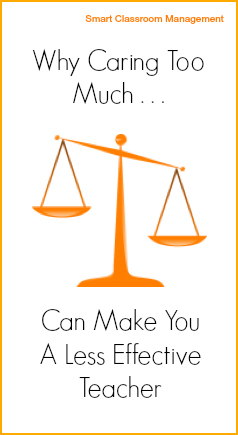Why Caring Too Much Can Make You A Less Effective Teacher
 Teaching is important, to be sure.
Teaching is important, to be sure.
But if you’re not careful, this fact can weigh heavily.
It can cause you to wrap an unhealthy amount of your identity into your job. It can cause you to be distracted around your friends and family.
It can cause you to care too much.
And when you care too much, not only are you wrung out, preoccupied, and no fun to be around, but you make mistakes that make you a less effective teacher.
You become personally offended when students misbehave. You become irritable, easily frustrated, and less approachable.
You become so invested in your students’ success, so pressured by administrative powers, that you begin doing for them what only they can do for themselves.
The truth is, the most effective teachers maintain a level of professional distance—from their students, their classroom, and even their school.
They view teaching as a two-way street. Meaning, they give their best for their students. They teach high-interest lessons. They build leverage and influence through their consistent pleasantness and likability. They create a learning experience their students want to be a part of.
But they also expect the best in return, which manifests itself in everything they do.
From enforcing consequences dispassionately to giving directions one time to their reluctance to kneel down and reteach individuals what was taught to the entire class minutes before . . . their actions announce to the world their deep and abiding belief in their students.
You see, when you take on what are your students’ responsibilities, even emotionally, they’ll be left with the message that they have a free pass.
So they shrug in response to your urgent exhortations. They ignore your requests for quiet. They listen only when convenient. They daydream and side-talk and count tiles on the ceiling.
It never occurs to them that they’re sitting in a sacred place of learning or that they desperately need what you have to offer. The result is a stressed-out teacher and a class full of students who just don’t care.
In the most effective classrooms, responsibilities are clearly separate and defined.
The teacher does their job well, providing everything their students need to be successful, then hands the onus to do the work, discuss the book, perform the experiment, and solve for x in full over to their students.
Your job is to teach, inspire, and hold accountable—which is completely in your control. When you focus your physical and emotional energy on these three core responsibilities, and determine to turn the rest over to your students, your stress will all but disappear.
At the same time, the whole vibe of your classroom will change. The winds of complacency and apathy will die out. Balance will be restored to the kingdom.
Your students will feel the burden of responsibility for learning and behaving settle upon their shoulders, where it belongs. Their respect for you will soar. Their sense of independence will swell. Rapport will come easy—light and effortless.
Your heavy mood, your hurt, and your disappointment will lift and dissipate into the heavens. You’ll have the energy you need to create your dream class. And you’ll finally be able to leave school at school.
Now both you and your students will possess the same look: Happy yet determined. Calm yet filled with purpose. Fulfilled yet resolute.
The way it’s supposed to be.

No comments:
Post a Comment